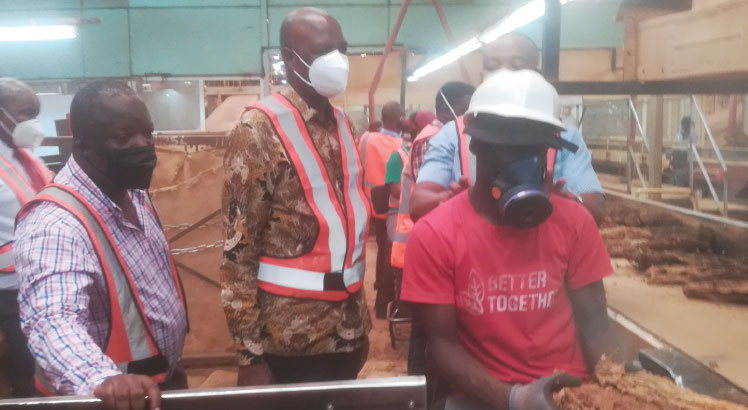Malawi loses out on Tobacco processing
JTI Leaf (Malawi) Limited says the country is losing out by not utilising its tobacco processing capacity to process tobacco from neighbouring countries due to taxes and levies imposed on local processors.
The company’s managing director John Gauna expressed the sentiments on Monday when Minister of Agriculture Lobin Lowe toured JTI’s $100 million (K82 billion) tobacco processing factory at Kanengo Industrial site in Lilongwe.
He said a number of tobacco processing factories have closed down in the neighbouring countries and this has created an opportunity for Malawi to position itself as a competitive alternative.

However, Gauna said taxes and levies in commodity processing are making the country unattractive.
He said: “In Malawi, we have a combined processing capacity of 240 million kilogrammes [kg], but at the moment we are not achieving anywhere near this. Currently, the crop production volume is 140 million kilogrammes.
“Non-value costs such as MBS Cess and the TC levy make our processing facilities less financially appealing. The knock-on effect on this is fewer jobs, less tax revenue and less economic activity in general during the tobacco season.”
Gauna touted the new factory, saying it has the capacity to process up to 50 million kg of leaf, but is currently processing around 40 million kg, up from 28 million kg last year.
He said JTI Malawi is underutilising its facility despite processing tobacco for other local parties. He added that an opportunity to process five million kg of Zambian tobacco has this year been lost due to levies and taxes.
Gauna explained that the levies and taxes and inefficiencies in the supply chain impact the global competitiveness of the country’s tobacco. He called for a holistic approach in addressing the issues to make the country’s leaf attractive.
The global supply and demand, he said, will continue to decline, but Malawi has an opportunity to build a niche market from local tobacco with its unique value.
In his remarks, Lowe said there is need to engage in a further dialogue on how best to iron out the bottlenecks that impinge on the maximisation of tobacco processing capacity for both local and imported tobacco.
He said by processing tobacco from other countries, Malawi will be able to earn extra revenue from tobacco, including job creation.
JTI employs 1 000 people at its processing factory.
The minister acknowledged that huge investments that tobacco buying companies are making in the country signify that the crop will be grown for decades to come, therefore, the country should work hard to ensure that it is the world’s leading burley tobacco producer.
Said Lowe: “The taxes and levies on imported tobacco for processing is something that, as government and tobacco processors, we can map the best way forward.
“It is not just a matter of talking but taking action to ensure that something is done.”
During the meeting, it was learnt that Tobacco Commission imposes a levy amounting to $0.05 (about K41) per kg and Malawi Bureau of Standards also imposes a tax on quality issues, among other levies.
JTI is an international tobacco company with operations in more than 130 countries.





